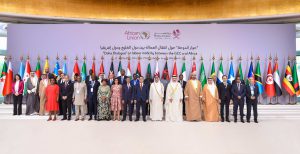DOHA/WAM
The UAE took part in the inaugural meetings of the Doha Dialogue, which focused on the temporary migration of workers from African nations to the Gulf Cooperation Council (GCC) countries, Jordan, and Lebanon.
Held in Doha, Qatar, the meetings were attended by Dr. Abdulrahman Al Awar, Minister of Human Resources and Emiratisation, as well as the ministers of labour and human resources from the African member states of the dialogue. Representatives from the African Union, the International Labour Organisation (ILO), the International Organisation for Migration (IOM), as well as experts and academics, were also present.
The launch of the Doha Dialogue forms part of a coordinated effort between Qatar and the African Union to develop a consultative mechanism among African countries, Gulf states, Jordan, and Lebanon. This initiative aims to implement best practices, building on the success of the Abu Dhabi Dialogue, which was initiated by the UAE in 2008 as a consultative mechanism between labour-sending and receiving Asian countries.
The Doha Dialogue aims to enhance regional cooperation and strengthen partnerships to enhance the recruitment of workers from African countries. This initiative responds to the increasing number of African workers migrating to the GCC and other Arab countries. The proportion of African workers is expected to rise in the coming years due to the sustainable growth in the GCC countries and their demand for diverse levels of employment.
Dr. Abdulrahman Al Awar commended the efforts of the Qatari team and the partners in the African Union for their contributions to launching the Doha Dialogue, noting that the Dialogue “aims to implement best practices for recruiting workers from the African continent, who make up a significant part of the workforce in the UAE as the country is home to more than 200 nationalities living in harmony and unity.”
“Establishing the foundations of a constructive dialogue, and developing targeted initiatives and forums are essential tools for fostering joint action and creating opportunities for cooperation,” Al Awar said. “These efforts are crucial for unifying visions and adopting sustainable solutions to address the emerging challenges posed by economic transformations in labour markets, which have significantly impacted the basic structure of labour markets, the job landscape, and the nature of work amidst the increasing role of technology and shifting global production schemes.”
He emphasised the UAE’s commitment to supporting efforts to establish a constructive, transparent, and sustainable consultative dialogue that seeks to address challenges and offer practical, innovative solutions, in line with modern trends. “The UAE recognises the importance of developing both bilateral and multilateral partnerships to enhance and improve the governance of labour mobility between countries of origin and destination,” he said.
“The Doha Dialogue holds special significance due to its complementarity with the Abu Dhabi Dialogue, established in 2008 as a forum for dialogue and cooperation between Asian countries of labour origin and destination,” Al Awar explained. “This initiative expands the scope of dialogue in the region to include various labour migration corridors. It allows for the examination of areas for improvement based on regional priorities and specific needs, thereby enhancing regional cooperation to improve labour mobility management.”
He highlighted the increased opportunities for employment that arise from consensus-building and shared visions regarding the required skills and methods for their development. Additionally, noting the relevance of these dialogues in understanding the realities of receiving sectors, such as domestic services, agriculture, construction, logistics services, travel, hospitality, and other service industries.
Al Awar highlighted several initiatives and programmes aimed at enhancing the attractiveness of the labour market in the UAE, underscoring the country’s humanitarian approach in establishing an integrated social protection umbrella that caters to all categories of workers from diverse nationalities, facilitated by a set of innovative systems.
Among these is the Unemployment Insurance Scheme, which offers temporary monthly income to workers who lose their jobs, in exchange for a nominal subscription fee. The Scheme has reported over 7.5 million subscribers, contributing significantly to the stability of workers and their families. He also cited Workers’ Protection Programme designed to safeguard workers’ financial entitlements upon the termination of their employment relationships, with coverage extended to 98.8% of workers in the UAE.
The Minister went on to highlight the voluntary Savings Scheme, whereby end-of-service benefits for private sector workers are invested in reputable investment funds, in a bid to generate investment returns for employees on their end-of-service benefits. He also shed light on the introduction of health insurance benefits for all workers in the UAE labour market. He explained that the UAE labour market has experienced a notable 9.14% increase in the number of companies, and a 10.53% in the workforce in 2023, compared to 2022.
He went on to say the UAE Government adopts digital transformation to foster development and wellbeing across all levels and sectors, including the labour market. The UAE has implemented 395 government digital transformation projects, achieving a 99% digital transformation rate for government services. As a result, the country was ranked first globally in the Government Services Index by the TKI Institute, and fourth globally in the GovTech Maturity Index by the World Bank.
Al Awar emphasised the significance of the UAE Labour Market Observatory, inaugurated by the Ministry of Human Resources and Emiratisation in January to provide comprehensive and timely data and statistics on the UAE labour market, enabling international and regional specialists, academics, and media to derive valuable insights.
The first edition of the Doha Dialogue focuses on matters pertaining to fair and ethical employment practices for expatriate workers, aiming to agree on the structure, mechanism, and terms of reference of the Dialogue. The participants deliberated on the work plan, budget, funding mechanism for the research programme, and selection process for priority topics.
 The Gulf Time Newspaper One of the finest business newspapers in the UAE brought to you by our professional writers and editors.
The Gulf Time Newspaper One of the finest business newspapers in the UAE brought to you by our professional writers and editors.
